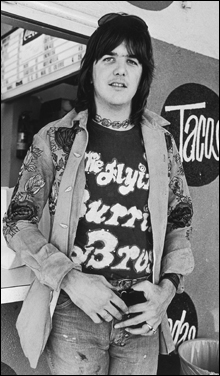
SWEET HEART: Before his death, Parsons sowed the seeds of alt-country and pretty much invented “Americana.” |
It’s no accident that Elvis Costello invited Emmylou Harris to join him and his half-rock/half-country band the Imposters on a tour supporting their rootsy 2004 album The Delivery Man (Lost Highway). Elvis was indulging his long fascination with Gram Parsons, the Florida-born singer-songwriter credited with reintroducing country music to rock and roll in the late ’60s and early ’70s. Through his association with the Byrds, the Stones, and Harris, Parsons pretty much invented Americana (he called it “cosmic American music”), sowing the seeds for “alt-country” when Jeff Tweedy and Jay Farrar were still in diapers. To find an artist of Costello’s stature paying such obvious tribute to the Parsons legacy three decades after his promising if commercially unsuccessful two-album partnership with Emmylou flamed out in a morass of drugs, drink, and women is a reflection of just how deep an impression Parsons left on the rock-and-roll landscape. He died in 1973, age 26.But everyone loves a good mystery. And music fans are no exception. What goes on backstage, behind the music, in that mysterious creative space where Exiles on Main Street congregate and Basement Tapes are born has always fascinated. Dylanology is just a chairperson away from finding its way into the curricula of respectable institutions for higher learning. True, separating myth from reality isn’t always pretty. Rock and roll’s secret history is littered with the spoiled bodies of damaged souls like Parsons, a rich kid with a trust fund and talent who flitted from the Byrds (one album) to the Flying Burrito Brothers (two albums) before striking out on his own (two albums with Emmylou) after a brief but intense friendship with the Stones.
That’s the story filmmaker Gandulf Hennig works his way to the bottom of in Gram Parsons: Fallen Angel, a 2004 feature-length documentary that Rhino has just released on DVD as a companion of sorts to the three-disc box set Gram Parsons: The Complete Reprise Sessions (also Rhino). It’s the latest installment of an ongoing Parsons revival that got a big boost from the heavyweight tribute album Return of the Grievous Angel (Almo) in 1999. Co-produced by Harris, that album brought alt-country stalwarts Lucinda Williams, Ryan Adams (with Whiskeytown), Wilco, and Steve Earle together with pure Parsons fans like Sheryl Crow, Beck, and the Pretenders. In the meantime, Columbia was busy setting the record straight on Sweetheart of the Rodeo, the landmark 1968 album Parsons recorded as a member of the Byrds. Although Parsons supplied the Byrds with two of his best songs (“Hickory Wind” and “One Hundred Years from Now”) as well as the very concept of a rock band recording a country album in Nashville, his lead vocals had been cut from the original album for contractual reasons. By 2003, Legacy was targeting the cult of Parsons with a two-disc edition of Sweetheart that does feature the original LP on one CD with bonus tracks. But the other disc is almost pure Parsons: six tracks by his band International Submarine Band plus demos, outtakes, and rehearsal tapes, many of which spotlight his vocals. Sweetheart would serve as a blueprint for succeeding country-rock hybrids.

Working with writer Sid Griffin (himself a veteran of the very Parsons-influenced roots-rock band the Long Riders), Hennig goes a long way toward clearing up any confusion regarding his subject’s life and music. It appears there isn’t much in the way of archival footage of the International Submarine Band — a group Parsons formed during a semester he spent failing out of Harvard — or even filmed interviews with Parsons himself. So Hennig relies on people close to Parsons to tell the story. There’s Byrds bassist Chris Hillman, who founded the Flying Burrito Brothers with Gram. Keith Richards, who “gave” Gram the Stones song “Wild Horses” for his final album with the Burrito Brothers, 1970’s Burrito Deluxe. Notorious road manager Phil Kaufman, who “stole” Gram’s body from LAX and attempted a botched cremation in the Joshua Tree desert. A dignified Emmylou Harris paints an empathetic portrait of a pathetic, drug-addled Gram in the years leading up to his death. And Gram’s wife and sister gently provide the details of his lovable if damaged private side.
What emerges is a charismatic, privileged, ambitious, immature product of two alcoholic parents who found a kind of salvation in rock stardom and comfort in the warm reception from stars like the Byrds and the Stones. His mom came from money; his father came from music. She drank herself to death before Gram left for Harvard; the father had already committed suicide when Gram was just a boy. An alcoholic stepfather and younger sister were all he had when a starstruck Gram landed in LA and hooked up with Stephen Stills and the Byrds. Keith Richards romanticizes Parsons as a magical presence who had a voice that made women weep; Hillman and early Eagles member Bernie Leadon, two of Gram’s fellow Burrito Brothers, are, like Harris, a bit more circumspect. Parsons quit the Byrds, legend has it, after Keith gave him the grim facts about their next tour stop, apartheid-torn South Africa. Hillman suggests that Parsons stayed behind in England because he wanted to hang out with the Stones. All it takes is a quick clip of Parsons, outfitted like the rest of the Burrito Brothers in gaudy Nudie cowboy suits and aping Mick Jagger’s stage moves, to sense where the truth lies.